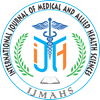Impact of Palliative Care Educational Intervention on Knowledge and Self-Efficacy of Nurses Caring for Terminally ill Non-Cancer Patients in Combined Military Hospital Rawalakot AJK
Pages : 49-57Download PDF
Abstract
Background: Over 40 million individuals need palliative care each year, with 78 percent of them living in low- and middle-income countries. Over the next several decades, the demand for palliative care is anticipated to rise
Aims: The current study aimed to evaluate the impact of Palliative Care Education sessions on Knowledge and Self-Efficacy of nurses caring for fatally ill non-cancer patients.
Design: Quasi-experimental design with a single group (pre and post-test) was used in the study
at Combined Military Hospital (CMH) Rawalakot Azad Kashmir.
Method & Materials: The sample size for the study was calculated through the G-power sample size calculator with a power of 0.95, an alpha error of 0.05 and an effect size of 0.5. The sample size given by G-power was (n=54), but with the 11% non-respond rate the total study participants selected for the study were 57.
Results: The total of 57 nurses participated in this Quasi-experimental study from four departments of the hospital. Greater part of the participants was between age (yr) of 20-30 (64.9%), followed by 31-40(19.30%), 41-50 (10.50%) and 51-60 (05.30%). Majority of the participants (77.20%) were having an experience of 01-05years, followed by 17.50% (5-10years), and 5.30% (above 10 years). nurses showed the knowledge mean score regarding the basics of palliative care (8.23), while post knowledge score were (16.54) and self-efficacy and confidence for providing palliative care to terminally ill non-cancer patients (26.63) in pre-test while (45.98) in post-test.
Conclusion: Nurses caring for patients with Congestive Heart Failure, stroke, End Stage Renal Diseases, and End Stage Liver Disease had worse palliative care expertise and were not as much confidence in palliative care management. The findings of this study revealed that nurses’ palliative care knowledge and self -efficacy significantly improved after a short palliative care nursing education session.
Key words: Palliative care, Nurses caring for patients, Palliative care expertise, Self-efficacy





